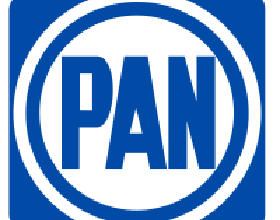The National Action Party(Partido Acción Nacional, PAN)

The National Action Party (Partido Acción Nacional, PAN) stands as one of Mexico's principal political entities, deeply rooted in the country's democratic fabric. Established on September 15, 1939, PAN was born out of a collaborative effort between the Catholic Church and conservative groups seeking to counterbalance the dominance of the Institutional Revolutionary Party (PRI) and to promote change through peaceful means following the Mexican Revolution. As a member of the Christian Democrat International, PAN aligns with Christian democratic principles, advocating for social justice, democratic governance, and economic liberalism.
Initially emerging as a voice for conservative and religious sectors, PAN has progressively broadened its base over the decades. It has transformed into a more comprehensive party that represents diverse segments of society, including the middle and upper-middle classes, entrepreneurs, and those advocating for free-market policies. PAN's commitment to democratic values and transparency has been instrumental in Mexico's political evolution, contributing to the end of PRI's long-standing single-party rule.
A milestone in PAN's history came in 2000 when its candidate, Vicente Fox Quesada, won the presidential election, marking the first peaceful transfer of power to an opposition party in Mexico's modern era. This victory not only broke the PRI's 71-year hold on the presidency but also signaled a new era of political pluralism. Under Fox's leadership and later under Felipe Calderón's presidency (2006-2012), PAN-led governments focused on economic liberalization, international trade agreements, and a hardline stance against drug cartels, although these policies were not without controversy.
Despite returning to opposition status after the 2012 elections, PAN remains a formidable force, actively participating in legislative processes and shaping public discourse. The party is currently chaired by Luis Felipe Bravo Mena, with Federico Ríos as its Secretary-General. PAN continues to advocate for reforms aimed at strengthening democratic institutions, promoting economic growth, and addressing pressing social issues such as inequality, education, and public safety.
PAN's adaptability and resilience have been evident in its ability to reposition itself in response to Mexico's shifting political dynamics. The party has shown a willingness to engage in coalition-building and dialogue with other political forces, demonstrating its commitment to the democratic process and the pursuit of a more equitable and prosperous Mexico. As Mexico faces ongoing challenges related to corruption, insecurity, and social disparities, PAN's role in shaping the national agenda and providing an alternative vision for the country remains critical to Mexico's ongoing democratization journey.
文献出处:

 CN
CN

